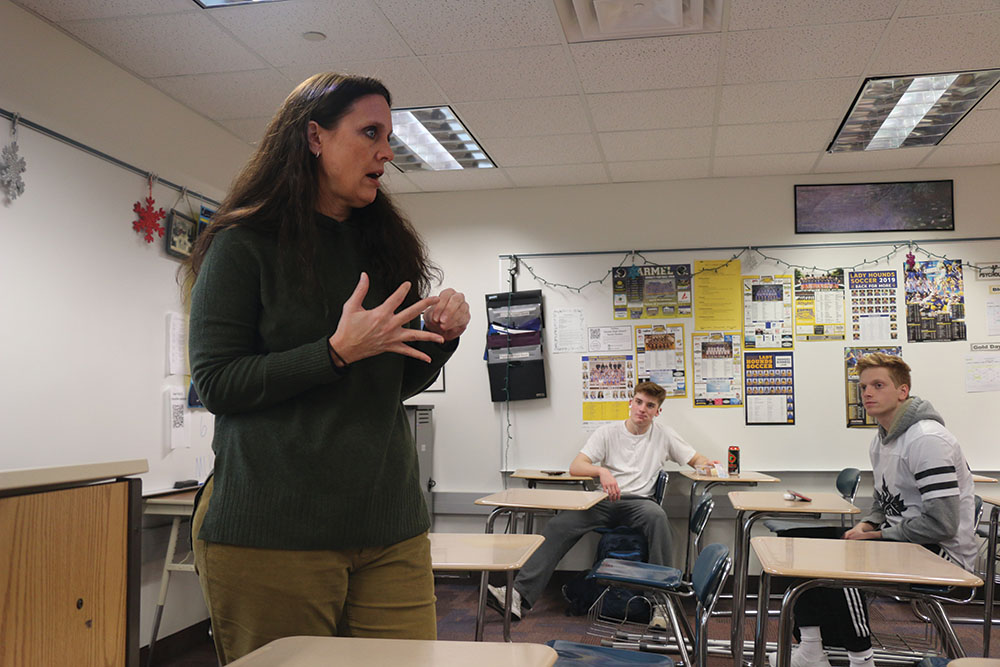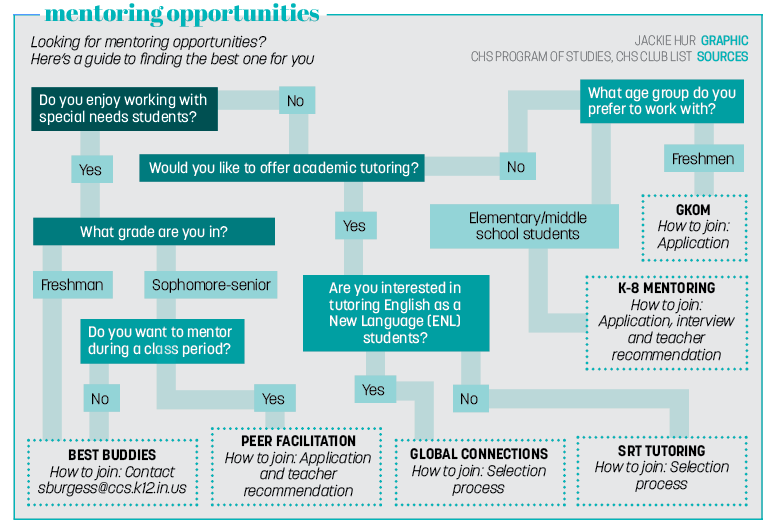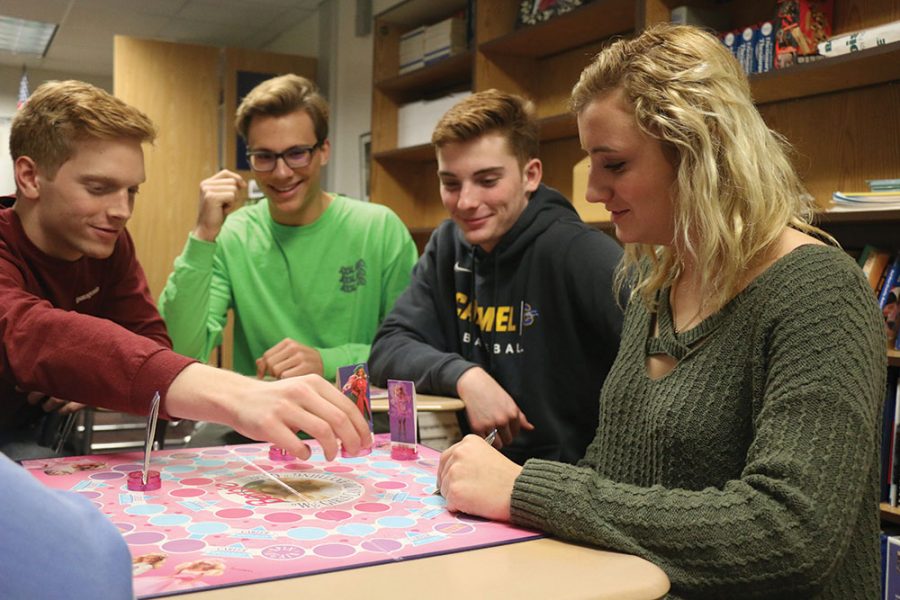Each year in January since 2002, the Harvard School of Public Health has led a National Mentoring Month. Over the past 18 years, this campaign has developed to promote mentoring, specifically in youth, in the United States. Officially defined as the act of advising or training, the role of the mentor is extremely prevalent at CHS, specifically seen in the K-8 Mentor program.
“The goal is to provide a one-on-one support, friendship (and) relationship to kids in our community that maybe need an extra buddy, a friend, academic help, social help or something to look forward to each week,” K-8 Mentor teacher Robin Pletcher said. “The role of a mentor is to be a role model and a friend to the mentee.”
According to Pletcher, her students meet with other, younger students throughout the Carmel Clay School district of the grades kindergarten through eighth grade, helping them academically, socially and emotionally.

BE A LEADER:
K-8 Mentor teacher Robin Pletcher lectures. Pletcher said mentors should be role models.
Cassidy Eckstein, K-8 Mentor student and senior, said, “I have four kids from four different schools and I go hang out with them for 30 minutes on gold days. We hang out with them, we play games with them and help them progress in whatever they’re struggling with. We would give them a person to talk to if they need it.”
Eckstein said the role of a mentor has completely altered her views as the role is not an easy one.
“(Mentoring has) opened (my eyes) to the world because I realize that there are a lot of hidden problems that you wouldn’t see just passing by in the hallways everyday. Just take a minute and listen to what their talking about and give them a support person,” she said.
Emma Heyl, K-8 Mentor student and junior, said this program has also impacted her and provided a changed view on what it means to be a mentor to someone in today’s world.
“(Being apart of this program) has impacted me a lot. It has been really interesting to see the ways these kids get used to you and how they adjust to you being there,” Heyl said. “At first, they were all really reserved and didn’t talk much. We really had to work to get information out of these kids. Now, I show up and they hug me or high five me because they are happy that I am there. It’s been really cool to see how I have impacted them and how they have impacted me.”
According to Pletcher, as a mentor, the most important characteristic to possess is the willingness to guide, help and assist others.
“Anybody can be a mentor; (you) just have that willingness to help others,” Pletcher said. “Have that responsibility to show up. You cannot say you are going to be a mentor and then just not be there, which is why having that consistency is so important.”
Heyl, who also aspires to be an elementary school teacher, said the program has set her up for success and has taught her more than she thought to be possible.
“I became a mentor because I have always loved working with kids. Ever since I was little I have wanted to be a teacher, and I still do. When I heard about this class, I thought it would be really beneficial to make relationships with these younger kids. Younger kids fascinate me and I think it’s really cool how they learn and how fast-paced they are. So when I heard about the program it just felt really right for me just to kind of see different schools and different students while trying to impact how they view their lives,” Heyl said.
In regards to the impact mentoring has on the life of the mentee, Eckstein said agrees with Heyl. She said she believes the goal of the program is to provide support and guide the mentee when they are struggling or feel alone.
“When you are mentoring someone, you are investing in the life of another human. You are showing that the other person has value and is important,” Pletcher said. “There is also that return because you feel better about yourself because you are investing in others. When you mentor someone else you learn more about yourself in the process.”

































![AI in films like "The Brutalist" is convenient, but shouldn’t take priority [opinion]](https://hilite.org/wp-content/uploads/2025/02/catherine-cover-1200x471.jpg)









































![Review: “The Immortal Soul Salvage Yard:” A criminally underrated poetry collection [MUSE]](https://hilite.org/wp-content/uploads/2025/03/71cju6TvqmL._AC_UF10001000_QL80_.jpg)
![Review: "Dog Man" is Unapologetically Chaotic [MUSE]](https://hilite.org/wp-content/uploads/2025/03/dogman-1200x700.jpg)
![Review: "Ne Zha 2": The WeChat family reunion I didn’t know I needed [MUSE]](https://hilite.org/wp-content/uploads/2025/03/unnamed-4.png)
![Review in Print: Maripaz Villar brings a delightfully unique style to the world of WEBTOON [MUSE]](https://hilite.org/wp-content/uploads/2023/12/maripazcover-1200x960.jpg)
![Review: “The Sword of Kaigen” is a masterpiece [MUSE]](https://hilite.org/wp-content/uploads/2023/11/Screenshot-2023-11-26-201051.png)
![Review: Gateron Oil Kings, great linear switches, okay price [MUSE]](https://hilite.org/wp-content/uploads/2023/11/Screenshot-2023-11-26-200553.png)
![Review: “A Haunting in Venice” is a significant improvement from other Agatha Christie adaptations [MUSE]](https://hilite.org/wp-content/uploads/2023/11/e7ee2938a6d422669771bce6d8088521.jpg)
![Review: A Thanksgiving story from elementary school, still just as interesting [MUSE]](https://hilite.org/wp-content/uploads/2023/11/Screenshot-2023-11-26-195514-987x1200.png)
![Review: "When I Fly Towards You", cute, uplifting youth drama [MUSE]](https://hilite.org/wp-content/uploads/2023/09/When-I-Fly-Towards-You-Chinese-drama.png)
![Postcards from Muse: Hawaii Travel Diary [MUSE]](https://hilite.org/wp-content/uploads/2023/09/My-project-1-1200x1200.jpg)
![Review: "Ladybug & Cat Noir: The Movie," departure from original show [MUSE]](https://hilite.org/wp-content/uploads/2023/09/Ladybug__Cat_Noir_-_The_Movie_poster.jpg)
![Review in Print: "Hidden Love" is the cute, uplifting drama everyone needs [MUSE]](https://hilite.org/wp-content/uploads/2023/09/hiddenlovecover-e1693597208225-1030x1200.png)
![Review in Print: "Heartstopper" is the heartwarming queer romance we all need [MUSE]](https://hilite.org/wp-content/uploads/2023/08/museheartstoppercover-1200x654.png)




